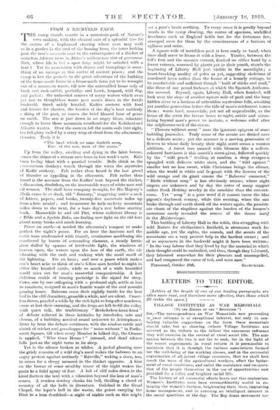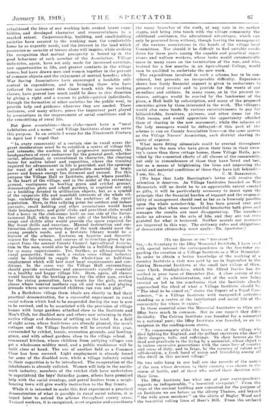LETTERS TO THE EDITOR.
[Lettere of the length of one of our leading paragraphs ore often more read, and therefore more effective, than those which fill treble the space.] VILLAGE INSTITUTES AS WAR MEMORIALS. [To TMa Ensues or ear ".ffrzontroa."3 SIH,—The correspondence on War Memorials • now proceeding in.your columns is of exceptional interest, not only in con- taining valuable suggestions on the form these memorials should take, but us showing (where Village Institutes are selected as the tribute to the fallen) the enormous influence. they will exercise In the revival of rural social life. The -con- nexion between the two is not far to seek, for in the light of the recent experiments in rural reform it is permissible to maintain that it is through the serious associations formed for the well-being of the working classes, and in the successful organization-of all Jatent village resources, that we shall best reach the mass of the agricultural -workers, effect the better- ment of rural conditions, and enlist the assistance and co-opera- tion of the people themselves in the use of opportunities now presided for a fuller and brighter social life.
The history of all successful efforts hears out this contention. Women's Institutes have been extraordinarily useful in en- larging the women's horizon, brightening their lives, improving home management, and in arousing an intelligent interest in the social questions of the day. The Boy Scout movement has
refashioned the lives of our working lads, evoked latent cape- bnlities, and developed character and resourcefulness to is marked extent. CO-partnership, building, and small-holding societies have secured to the working man the comfortable borne he so urgently needs, and the interest in the land which Possession or security of tenure alone will inspire, while evoking the recognition that mutual prosperity is bound up in the good behaviour of each member of the Association. Village industries, again, have not only made for increased earnings, new opportunities in life, and greater comforts in the village homes, but have drawn men and seamen together in the pursuit of common objects and the enjoyment of mutual benefits; while War Saving Associations have encouraged a laudable self- control in expenditure, and in bringing those who have fathered the movement into closer touch with the working classes, have proved how much could be done in this direction by giving a right and a reason to public-spirited individuals, through the formation of other societies for the public weal, to provide help and guidance wherever they are needed. These instances, and many others, prove the important part played by associations in the improvement of social conditions and in the remodelling of rural life.
But those associations—these clubs—must have a "local hahifation and a name," and Village Institutes alone can serve this purpose. In an article I wrote for the Nineteenth Century in April last I urged that "In every community of a certain size- in rural areas they great desideratum must he to establish a centre of village life and interests; the nucleus of all progressive movement, the headquarters of every endeavour for the general good, whether social, educational, or recreational in character, the clearing house for native talent and capacities, where the training required for advancement in life is provided, and the openings for want of which so much productive material in brain power and human energy lies dormant and unused. For this purpose the Village Hall or Institute, placed, where possible, in the heart of the village, and in the midst of the recreation ground, contiguous to bowling green and cricket ground, demonstration plots and school gardens, is required not only as a building devoted- to utilitarian objects, but as a symbol of the corporate life and manifold interests of the whole vil- lage, embodying the ideals and the ambitions of the rural population. Here, in this rallying point for outdoor and indoor pursuits, small holding and other associations would have- their headquarters, and girls' clubs and provident clubs would find a home in the club-rooms built on one side of the Enter- tainment Hall, while on the other side of the building a rifle range and skittle alley would provide the space required for Boy Scout drills and exercises. Manual instruction and con- tinuation.classes on certain days of the week should meet the young people's needs, and a first-rate library would be a feature of the scheme. Lectures on hygiene and domestic science for the women, and courses of instruction given by an expert from the nearest County Council Agricultural Associa- tion to the men, would also be possible in a building designed for so many requirements. Yet, further, as an-important to rural prosperity, from such a centre some village industry could be initiated to supply the whole-time or half-time employment which will best meet local requirements and con- ditions. In the some way the Village Hall surrounding, should provide recreations and amusements equally essential to a healthy and happy village life. Here, again, all classes would benefit by the bowling green for the older men, cricket for the rising generation, lawn tennis for the girls, resting places where wearied mothers can sit and work, and playing grounds where never-wearied children can run and play.'
In a Berkshire village these ideals are shortly to find their practical demonstration, for a successful experiment in rural social reform which had to be suspended during the war is now to be revived; and to be associated with the provision of village homes with large gardens attached close to the Institute and Men's Club, for disabled men and others now returning to their native village and desirous of settling on the land. In a field of eight acres, where fruit-trees are already planted, the men's cottages and the Village Institute will be erected this year, surrounded by cricket, tennis, recreation grounds, and bowling- green, and with school gardens close to the village school. A communal kitchen, where children from outlying villages can get a wholesome midday meal, and a public washhouse will be built close at hand. The use of another field as a Common Close has been secured. Light employment is already found for some of the disabled men, while a village industry suited to their capacities is to be introduced. The co-operation of the inhabitants in already enlisted. Women will help in the needle- work industry, members of the cricket club have undertaken to !superintend the boys' Saturday games, others have promised help with the social evenings, and patrol leaders from a neigh- bouring town will give weekly instruction to the Boy Scouts.
While it is intended to make this first experiment a practical demonstration of what is possible in rural social reform, it is hoped later to extend the scheme throughout county areas. Trained workers, it is recognived, most organise and co-ordinate the many branches of the work, at any rate in its earlier stages, and bring into touch with the village community the additional assistance, the educational nnlvantages, which can only be procured from without, though leaving the management of the various associations in the hands of the village local Committees. Nor should it be difficult to find suitable candi- dates for these posts among the capable and practical super- visors and welfare workers, whose tasks would automatically cease in many cases on the termination of the war, and who, trained for a few months in an Agricultural College, would soon be qualified to undertake the new work.
The expenditure involved in Ruch a scheme has to be con- sidered, but presents 710 insuperable difficulty. Experience shows how freely financial support is given to endeavours to promote rural revival and to provide for the wants of our ex-sailors and soldiers. In many cases, as in the present in- stance, cottages would be erected by the landowner of the place, a Hall built by subscription, and many of the proposed amenities given by those interested in the work. The villagers would also raise funds liy various entertainments to pay for billiard-table, furniture, pictures, and other items for the Club rooms, and would appreciate' the opportunity afforded them of sharing in the new movement; while the- salaries of the lady managers would be defrayed—if this part of the scheme is run on County Association lines—on the seine roystent as the Village /Curses' Association, each district sharing its quota of expense.
What more fitting Memorials could be erected throughout England to the men who have given their lives' in their coun- try's cause than these cottage homes, these Village Halls, pro- vided by the concerted efforts of all classes of the community. not only in remembrance of thane they have loved and lost, but as a means of brightening the lives and improving the social and material conditions of those they have left behind's— [We hope that Lady Barrington's letter will receive the attention it deserves. As Village Institutes founded as War Memorials will no doubt be to an appreciable extent scented as gifts, it will be particularly neressery to insist upon the principle that the financial burden of support and the responsi- bility of management should root as far as is humanly possible upon the whole membership. It has been proved over and over again that when some bountiful benefactor both gives and manages the results are most disappointing. The members make no advance in the art. of life. and they are not even grateful for what is bestowed. Neither morals our manners are improved in this way. The ordinary rules and obligations of democratic ettiseuship must apply.—En. Spectator.]



































 Previous page
Previous page